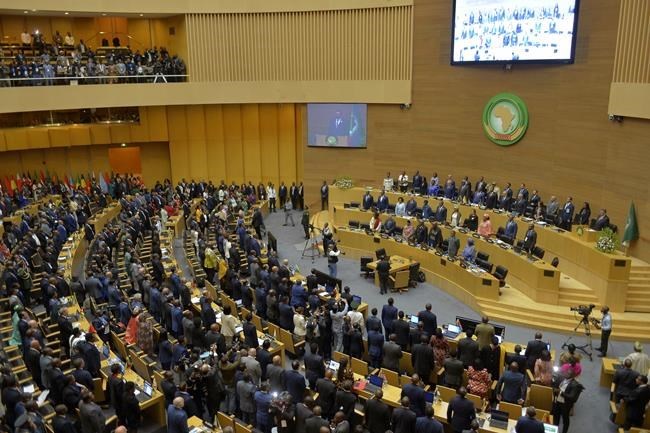UNITED NATIONS (AP) — The United States vetoed an Arab-backed U.N. resolution Tuesday demanding an immediate humanitarian cease-fire in the Israel-Hamas war in the embattled Gaza Strip.
The vote in the 15-member Security Council was 13-1 with the United Kingdom abstaining, reflecting the wide global support for ending the more than four-month war that started with Hamas' surprise invasion of southern Israel that killed about 1,200 people and saw 250 others taken hostage. Since then, more than 29,000 Palestinians have been killed in Israel's military offensive, according to the Gaza Health Ministry, which doesn’t distinguish between civilians and combatants but says the majority are women and children.
It was the third U.S. veto of a Security Council resolution demanding a cease-fire in Gaza.
The Biden administration had said it would veto the resolution because of concerns it would interfere with efforts to arrange a deal between the warring parties aimed at bringing at least a six-week halt to hostilities and releasing all hostages.
In a surprise move ahead of the vote, the United States circulated a rival U.N. Security Council resolution that would support a temporary cease-fire in Gaza linked to the release of all hostages, and call for the lifting of all restrictions on the delivery of humanitarian aid. Both of these actions “would help to create the conditions for a sustainable cessation of hostilities,” the draft resolution obtained by The Associated Press says.
U.S. deputy ambassador Robert Wood told several reporters Monday that the Arab-backed resolution is not “an effective mechanism for trying to do the three things that we want to see happen — which is get hostages out, more aid in, and a lengthy pause to this conflict.”
With the U.S. draft, “what we’re looking at is another possible option, and we’ll be discussing this with friends going forward,” Wood said. “I don’t think you can expect anything to happen tomorrow.”
A senior U.S. official said later Monday that, “We don’t believe in a rush to a vote.” The official, speaking on condition of anonymity ahead of council discussions on the U.S. draft, said, “We intend to engage in the coming days in intensive negotiation around it. … That’s why we’re not putting a timeline on a vote, but we do recognize the urgency of the situation.”
Arab nations, supported by many of the 193 U.N. member countries, have been demanding a cease-fire for months.
Tunisia’s U.N. Ambassador Tarek Ladeb, this month’s chair of the 22-nation Arab Group, told U.N. reporters last Wednesday that a cease-fire is urgently needed.
He pointed to some 1.5 million Palestinians who sought safety in Gaza’s southern city of Rafah and face a “catastrophic scenario” if Israeli Prime Minister Benjamin Netanyahu goes ahead with his announced plan to evacuate civilians from the city and move Israel’s military offensive to the area bordering Egypt where Israel says Hamas fighters are hiding.
In addition to a cease-fire now, the Arab-backed draft resolution demands the immediate release of all hostages, rejects the forced displacement of Palestinian civilians, calls for unhindered humanitarian access throughout Gaza, and reiterates council demands that Israel and Hamas “scrupulously comply” with international law, especially the protection of civilians. Without naming either party, it condemns “all acts of terrorism”
In a tough message to Israel, the U.S. draft resolution says Israel’s planned major ground offensive in Rafah “should not proceed under current circumstances.” And it warns that further displacement of civilians, “including potentially into neighboring countries,” a reference to Egypt, would have serious implications for regional peace and security.
U.S. Ambassador Linda Thomas-Greenfield, in a statement Sunday, explained that the United States has been working on a hostage deal for months. She said U.S. President Joe Biden has had multiple calls over the last week with Netanyahu and the leaders of Egypt and Qatar to push the deal forward.
“Though gaps remain, the key elements are on the table,” she said, and the deal remains the best opportunity to free the hostages and have a sustained pause that would enable lifesaving aid to get to needy Palestinians.
The 15 Security Council members have been negotiating on the Arab-backed resolution for three weeks. Algeria, the Arab representative on the council, delayed a vote at U.S. request while U.S. Secretary of State Antony Blinken was recently in the region, hoping to get a hostage deal. But Qatar said Saturday the talks “have not been progressing as expected.” And the Arab Group decided over the weekend that they had given the U.S. enough time and put their resolution in final form for a vote.
What will happen after the U.S. casts its veto remains to be seen. The Arab Group could take their resolution to the U.N. General Assembly, which includes all 193 U.N. member nations, where it is virtually certain to be approved. But unlike Security Council resolutions, assembly resolutions are not legally binding.
The Security Council will then likely start discussing the much-lengthier U.S. draft resolution, which would for the first time not only condemn Hamas’ Oct. 7 attack but its hostage taking and killing, “murder, and sexual violence including rape.” Some council members blocked the condemnation of Hamas in two previous council resolutions on Gaza.
The U.S. draft doesn't name Israel, but in a clear reference the draft “condemns calls by government ministers for the resettlement of Gaza and rejects any attempt at demographic or territorial change in Gaza that would violate international law.”
Edith M. Lederer, The Associated Press




